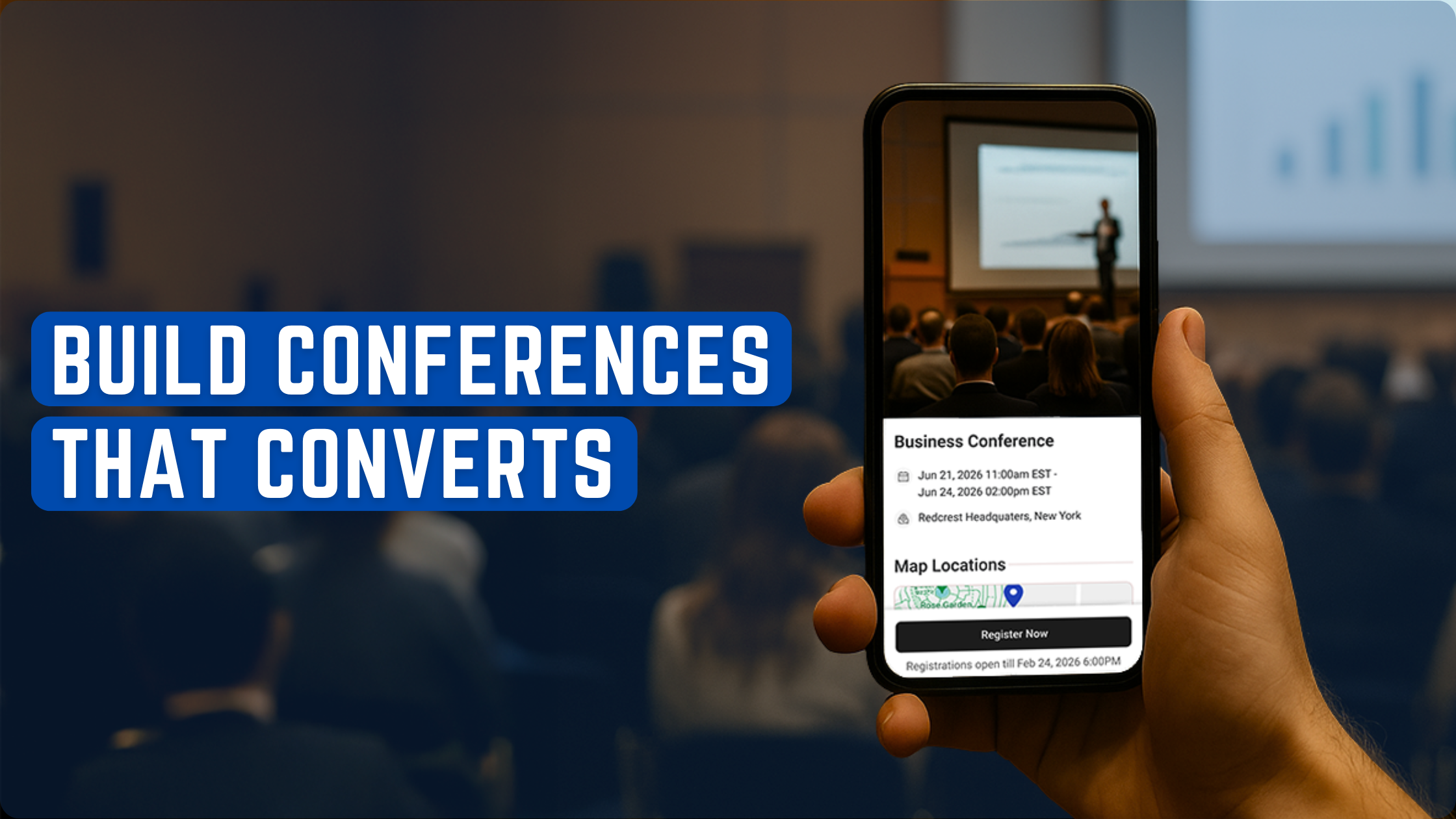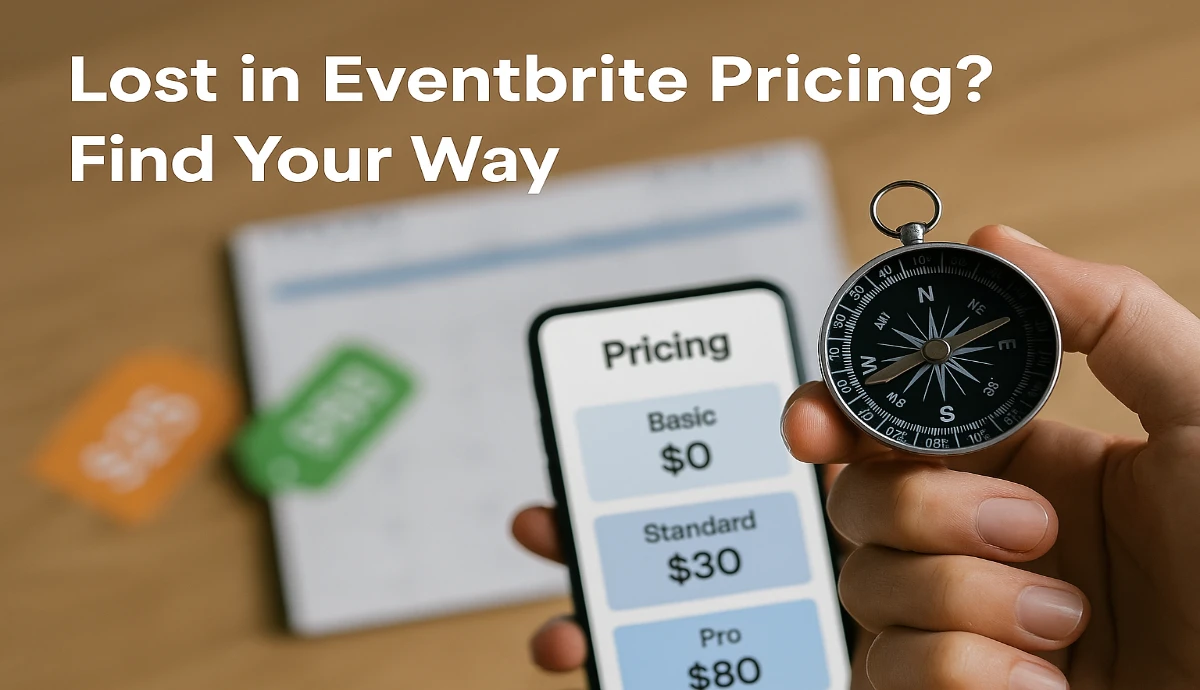Still using spreadsheets to manage events in 2025?
Even with hybrid events, real-time data, and digital-first attendees, many organizers still rely on scattered tools. The result? Lost time, poor experiences, and missed goals.
This is why the best event management software is so valuable. A modern event management platform helps you plan, promote, manage, and track your events — all from one place.
Whether you rely on an event management website for registrations or run complex hybrid events, the right software simplifies every stage of the process.
In this guide, you’ll learn what event software does, why it matters in 2025, what features to look for, and how to choose the right tool.
A. What is event management software?

Event management software is a tool that helps you plan and run events in one place. It replaces spreadsheets, emails, and manual checklists with a system that keeps everything organized.
Most tools include:
- Online sign-up and RSVP tracking
- Ticket creation and check-ins
- Email or text reminders
- Reports to track event results
A good event management system works for any type of event — in-person, online, or both. It grows with your needs and helps you stay in control.
These platforms save time, reduce stress, and make events easier to manage from start to finish.
B. Why an event management platform is no longer optional

Planning events today is more demanding than ever. Teams often manage both in-person and online guests. At the same time, attendees expect simple sign-ups, fast updates, and a smooth experience from start to finish.
Trying to juggle emails, spreadsheets, and separate tools makes that hard. It slows teams down, leads to mistakes, and adds stress.
A modern event management platform brings everything into one place. It helps teams stay organized, reduce back-and-forth, and get more done with less effort.
The best event management software also gives you insights, like how many people signed up, what worked, and what to improve next time.
Many platforms now include tools to build an event management website where guests can find details, register, and get updates — all in one spot.
What the right platform helps you do
- Keep all tasks in one system
- Work faster with fewer mistakes
- Create a better experience for your attendees
- Use data to improve your next event
C. Key features to look for in the best event management software
Not every platform offers the same value. Some focus on just one area of planning, while others try to cover it all — which can get overwhelming. The key is to choose the best event management software based on your actual needs.
Here are the top features to look for — and why they are important:
- Registration tools: Let people sign up with ease and collect the right information. A strong event management system allows you to customize forms and control access
- Ticketing system: Create and send digital tickets, manage guest lists, and check people in using QR codes. This keeps things smooth on event day
- Event website builder: Build an event management website to share all your event info in one place — like dates, speakers, agendas, and maps
- Communication tools: Send reminders, updates, or last-minute changes via email or text. This helps reduce confusion and no-shows
- Analytics dashboard: See how your event is doing in real time. Good data helps you make better decisions for this event — and the next one
- Integrations: Make sure the tool works with what you already use, like your email platform, CRM, or payment system. A strong event management platform should connect everything
These features aren’t just nice to have — they’re what help your team stay focused, your event run smoothly, and your guests enjoy the experience.
D. How to choose the right event management tool
Once you know what features matter most, the next step is choosing a tool that actually fits how your team works. This choice depends more on your goals and workflows than on long feature lists.
Here’s how to make the right decision:
- Match the tool to your event goals: Do you want to grow attendance, improve guest experience, or speed up planning? Your goals should guide your choice
- Think about your team’s workflow: A tool might be powerful, but is it simple to use? The best event management software should make tasks easier, not more complex
- Test how it fits your stack: A good event management platform should work with tools you already use, like CRMs, email platforms, or payment apps
- Consider future needs: You may start small, but your events can grow. A flexible event management application should scale with you
Making the right choice isn’t about getting the most features — it’s about finding the best fit for how your team plans and runs events.
E. Comparing popular event management tools
With so many event platforms available, it’s easy to feel overwhelmed. But the best tool isn’t the one with the longest list of features — it’s the one that matches how you plan, what kind of events you run, and the size of your team.
Some platforms are built for large-scale conferences. Others are perfect for hybrid meetups or small, recurring events. To help you choose, we’ve created a comparison based on pricing, features, event types, and best use cases.
Here’s what to know before you decide:
- Bizzabo works best for complex, large-scale events that need everything from branding to mobile apps. But its quote-based pricing and enterprise focus mean it’s not ideal for small teams or limited budgets.
- Airmeet is made for virtual and hybrid events where attendee interaction is key. Tools like speed networking and live chat make it stand out. It's flexible, but may be more than needed for simple in-person gatherings.
- Eventbrite is user-friendly and fast to launch. Great for ticketed or public-facing events with built-in discovery, though branding and customization are limited on lower tiers.
- Whova supports detailed event schedules and rich attendee engagement. It’s especially good for conferences and expos with multiple sessions and speakers.
- Cvent offers one of the most complete enterprise solutions. With robust reporting, CRM integrations, and venue management, it’s built for big operations — and comes with a learning curve.
- Zoho Backstage is ideal for small and mid-sized teams, especially those already using Zoho tools. It’s flexible, affordable, and supports hybrid formats, but full power often depends on using it as part of the Zoho suite.
When you know your goals and workflows, this kind of comparison helps you find not just the “best” event management software, but the best one for you.
F. Real-life scenarios: How different tools support different needs
Every event is different. The right tool depends on what you’re trying to do and how you want things to run. Here are a few simplified examples showing how teams solve different challenges using the right event management platform or supporting tools.
Scenario 1: A growing startup hosting a product launch
- Problem: They need to manage RSVPs, send reminders, and check people in at the venue — all with a small team.
- Solution: They choose a tool that focuses on fast setup, mobile access, and easy guest check-ins.
- Impact: They save time, avoid crowding at the door, and give attendees a smooth experience.
Scenario 2: A university planning a 3-day academic conference
- Problem: They need to manage speaker sessions, multiple attendee types, and long event schedules.
- Solution: They use an event management system with agenda tools, session tracking, and badge printing.
- Impact: Attendees can easily follow the schedule, and the organizing team stays in control the whole time.
Scenario 3: A nonprofit running a hybrid fundraiser
- Problem: They want to engage both in-person and online guests, collect donations, and follow up after the event.
- Solution: They chose an event management tool that supports hybrid formats, has built-in donation options, and email follow-ups.
- Impact: They raise more funds and keep both audiences involved, without doubling their workload.
Scenario 4: A marketing team hosting monthly webinars
- Problem: They need a repeatable way to manage sign-ups, send reminders, and collect leads.
- Solution: They use a simple platform that handles registration, email reminders, and CRM integration.
- Impact: The team saves hours each month and keeps their webinar workflow smooth and consistent.
These examples show how different needs call for different tools. The best event management software is the one that fits your event type, team, and workflow, not the one with the most features.
G. People also ask
Here are answers to some common questions from teams exploring event software for the first time:
1. What is the difference between event management and ticketing software?
Event management software covers the full planning process — from sign-ups and communication to reporting. Ticketing software focuses only on issuing and managing tickets.
2. Can small teams use event management tools?
Yes. Many platforms are built for small teams and don’t require a big budget or technical skills. Start with the basics and scale as you grow.
3. Do I need a complete platform or just one tool?
It depends on your event. A complete event management system may help with complex, multi-day events. Smaller events may only need one or two tools, like ticketing or email reminders.
4. Is there free event software available?
Some tools offer free plans or trials with limited features. These can be a good starting point for small or one-time events.
5. Can I build an event website without coding?
Yes. Many platforms include drag-and-drop builders to create a basic event management website without any code.
H. Conclusion
Choosing the right tool can make event planning faster, easier, and less stressful. The best event management software is the one that fits your event type, team size, and goals, not the one with the most features.
Start small. Focus on solving one or two major challenges first, like ticketing, registration, or follow-up. As your events grow, your tools can grow with you.
Some teams begin with simple, focused tools to cover one part of the process. For example, if secure ticketing is your starting point, a platform like Ticket Generator can help you get started quickly and integrate smoothly with a broader event management platform.
In the end, the right event management system should save you time, improve the attendee experience, and give your team more control over every step.






.gif)





